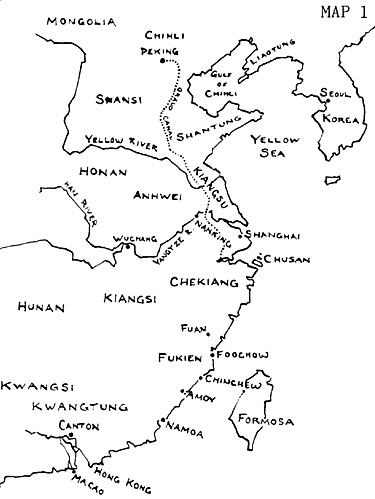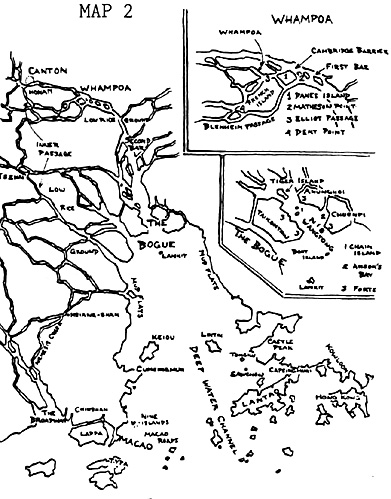 On August 15, Lin ordered that all
supplies of food and labor would be cut off for
all British, whether they were in Macao or an
board ships. A few days later, the governor of
Macao received instructions to expel all English
from his territory. The entire British community
embarked an various vessels and began their
exile at sea, They sailed from Macao to the
uninhabited island of Hong Kong, where the
British were condemned to stay until the killer
of Lin Wei-shi was given up to the Chinese
authorities.
On August 15, Lin ordered that all
supplies of food and labor would be cut off for
all British, whether they were in Macao or an
board ships. A few days later, the governor of
Macao received instructions to expel all English
from his territory. The entire British community
embarked an various vessels and began their
exile at sea, They sailed from Macao to the
uninhabited island of Hong Kong, where the
British were condemned to stay until the killer
of Lin Wei-shi was given up to the Chinese
authorities.
The shortage of supplies was soon to be felt and great hardships were suffered by the British. Elliot sent a formal protest to Commissioner Lin, but his complaint fell of deaf ears. The entire community in exile had to live on those precious few supplies brought in by smugglers who demanded an exorbitant price for their goods.
On August 31, the 26-gun frigate VOLAGE, under the command of Capt. H. Smith, arrived in Hong Kong from Aden. Shortly after it was joined by the 18-gun corvette HYACINTH.
With the support of the two armed warships, Elliot went to Kowloon to arrange for supplies to be purchased. Some Chinese war junks discovered Elliot's endeavor, and decided to stop the delivery of the supplies. The two warships opened fire and the junks were quickly scattered. The British suffered some minor casualties but neither ship was severely damaged. This trivial skirmish was called the Battle of Kowloon and was considered the beginning of the Opium War.
Starting a pattern to be repeated throughout the coming war, the Chinese sent a completely ficticious report to the Emperor. The fact was that by the middle of the 19th Century, the Chinese military bureaucracy was riddled with corruption and incompetence. Local commanders often give highly inflated battle reports in order to court favors from their superiors. Therefore, as far as Emperor Tao- kuang was concerned, the first round of the Anglo-Chinese conflict was a resounding victory for the Middle Kingdom.
The Battle of Kowloon resulted in a flow of supplies to the exiles now freed from Chinese interference. Yet despite this temporary breathing space, the British were obviously hoping for a more listing result. News of the predicament of the British community in China had just reached England, and many resolutions were sent to the government urging action against the Chinese. The Chinese also realized that a war was the only solution.
Commissioner Lin warned Elliot that Chinese forces had been mobilized at Canton, and that they would go to the Bogue for a general assault. Lin was confident about his military operation, for he had a misconception about the competence of western armies. In a message he sent to the Emperor, he stated that the westerners were inferior in melee and that they had problems with maneuvers since they bound their feet!
 In reply to Lin's threat of war, Elliot
sent the two warships to Chuenpi, one of the
Bogue islands (see map 2). They presented a note
to the Chinese authorities demanding the
withdrawal of Lin's threat and allowing the
British to live ashore. The Chinese replied with
a request for the surrender of Lin Wei-shi's
murderer. After their request was refused by the
British, the Chinese forces, led by
Admiral Kuan Tien-pei, began advancing on the
British warships with 29 war junks.
In reply to Lin's threat of war, Elliot
sent the two warships to Chuenpi, one of the
Bogue islands (see map 2). They presented a note
to the Chinese authorities demanding the
withdrawal of Lin's threat and allowing the
British to live ashore. The Chinese replied with
a request for the surrender of Lin Wei-shi's
murderer. After their request was refused by the
British, the Chinese forces, led by
Admiral Kuan Tien-pei, began advancing on the
British warships with 29 war junks.
These war junks were decorated with colorful streamers and had their guns painted red. In a contest of might against western warships these harbor showpieces were totally ineffective. The VOLAGE and the HYACINTH sank four of the war junks and heavily damaged several others. The rest of the Chinese fleet then retreated to the other side of the Bogue, where they were out of range of the British guns. Their only fame won from the action was the bravery of Admiral Kuan, which was even mentioned by Elliot.
In his dispatch to the Emperor, Lin reported the Battle of Chuenpi as another smashing victory. He also mentioned two more ficticious engagements on the following day from which the Chinese again emerged victorious! Thus, as far as emperor Tao-kuang was concerned, the first phase of the Opium War was going as well as could be expected.
The Opium War Part 1
- Introduction
The Opening Shot
The First Expedition
On to the Peiho
Battle of the Bogue
The Ransom of Canton
Back to Table of Contents -- Savage and Soldier Vol. XIX No. 3
Back to Savage and Soldier List of Issues
Back to MagWeb Magazine List
© Copyright 2004 by Milton Soong.
This article appears in MagWeb (Magazine Web) on the Internet World Wide Web.
Other articles from military history and related magazines are available at http://www.magweb.com